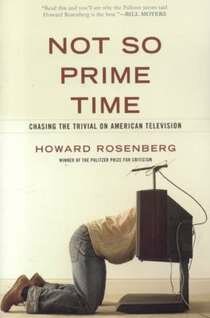Not So Prime Time: Chasing the Trivial on American Television
From Not So Prime Time: Chasing the Trivial on American Television:
In Barry Levinsons film Avalon several generations of a large Baltimore family gather in front of a new television set in the 1950s, eyes young and old lasered to the small screen as if waiting for the curtain to rise on a spectacular production. Television is in its infancy, and before the Krichinskys in their living room, utterly transfixing them like nothing theyve seen previously, is a static, unending, black and white test pattern bearing the call letters of the network they are watching. Our article rewriting service (main archive with the most important projects is located at https://writology.com/rewriting) offers you an opportunity to order additional editing for your own finished tasks. Its a revealing snapshot of America at mid-century and a powerful symbol, for the boisterous Krichinskys had always been defined by their verbal communications and by a storytelling grandfather passing down to the children tales describing his own boyhood in Eastern Europe. In this scene no one is speaking, however, and no one is moving. One wonders, in fact, if the Krichinskys are even thinking as they come under the spell of this newly unboxed technology that will alter their lives. Near the end of Avalon, when the grandfather starts to tell a story to a grandchild, the boy turns away to watch TV. Simpler times, perhaps, but in some ways foreshadowing what was coming as television wired and transformed our culture. Years later I began observing a similar glazed-over look in the eyes of viewers before thirty-two-inch screenssilent, rapt, seduced, their brain waves flattened now by live television pictures of police pursuits on freeways, not appearing to notice or care that each of these gratuitous exercises in media flatulence played out much like the other. In effect, this contemporary audience too was watching a test pattern, a marathon freeze frame and monotone buzz of media not unlike the one that British critic and philosopher Malcolm Muggeridge aptly titled Newzac. The puny and frivolous are sometimes elusive, even for U.S. television. Admirable work does on occasion rise heroically to the top, somehow squirming its way through the industrys blubbery layers of greed, cynicism and superficiality. Resonating loudest, though, are the trifles, the ones much of television has come to pursue as tenaciously as those cops do fugitives on freeways. Which should give us all pause. Are these the stories that tomorrows elders will pass down to their grandchildren? |
|

